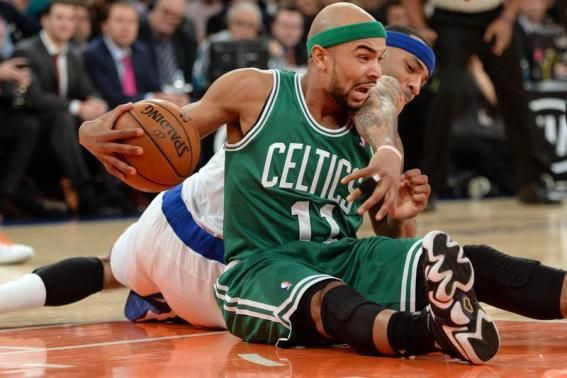Lakers, Celtics Rivalry Cools With Losing Seasons

The historic rivalry between the Los Angeles Lakers and the Boston Celtics appeared the same, the green uniforms of the visiting team perfectly complementing the home side's purple-and-gold.
Lakers fans filled Staples Center with deafening "Boston sucks" chants in the fourth quarter before winning 101-92. The stakes were high, but in an atypical fashion.
The two most storied franchises of the NBA, who have accounted for 33 of the league's 67 titles, are now on the other end of the won-lost list, having entered Friday's game with 37 combined wins against 72 defeats with nearly identical records.
Having battled for the NBA championship as recently as four years ago, Boston and Los Angeles are now jockeying for NBA Draft position.
This season featured the first time the Lakers and Celtics faced each other with losing records since the 1994 season.
Only Lakers guard Kobe Bryant, forward Pau Gasol and Boston guard Rajon Rondo remain from the 2009-10 title clash in which the Lakers triumphed over the Celtics in seven games. Two years prior, Boston won the Larry O'Brien Trophy in six games.
The rivalry dates back to the '60s, when the likes of Bill Russell, Jerry West and Wilt Chamberlain battled in seven NBA Finals, each one resulting in a Boston win.
The second coming of the rivalry occurred in the 1980s, starring Magic Johnson and Larry Bird. In three NBA championship head-to-head jousts, Los Angeles and Magic won two.
Current Lakers assistant and former player Kurt Rambis competed in the contentious '80s series and was on the sideline assisting legendary head coach Phil Jackson during the most recent iteration.
"When both teams were at an elite level, it's extremely exciting, intense. There's nothing like playing in it," Rambis told Reuters.
"Where both teams presently are, I don't think either team looks at it as a rivalry in any shape or form. I'm sure management-wise, long-standing fans of both teams would like to see their team win, but in terms of the intensity and rivalry, it doesn't exist right now."
NOW REBUILDING
In Boston, general manager Danny Ainge traded fading stars Paul Pierce and Kevin Garnett to the Brooklyn Nets, recouping a slew of draft picks.
Coach Doc Rivers left for the Los Angeles Clippers, and the franchise signed Butler University's Brad Stevens, 37, to a six-year deal as head coach.
The message was clear: rebuilding starts now.
"Well obviously neither of us are as good as we want to be," Stevens told reporters before the game before waxing about the glory days of the rivalry.
"But I think everybody gets it. Everybody, at different times throughout their lives, have watched it in awe.
"It felt like Boston and LA were playing every Sunday. It was the only game I ever felt like got on TV," he joked. "Hopefully both of us are not where we are (for) long."
On the West Coast, injuries to stalwart Bryant and aging point guard Steve Nash, in addition to losing center Dwight Howard to free agency one season after trading for him have derailed the season.
Bryant, ever the workhorse, set his sights on returning from a torn Achilles last December.
But he fractured his left tibia in his sixth game back. The sidelined Bryant still experiences swelling and pain in his knee and doctors will reevaluate the 35 year old in three weeks.
Lakers coach Mike D'Antoni also observed the Boston-Los Angeles rivalry from afar, but he did not view this game differently from any other.
"We need a win," D'Antoni said before the contest. "I don't care who walks in the arena. I'm sure the fans look at that. It's always a little bit better, always a little buzz, there's no doubt."
Rambis said the current state of the once sizzling rivalry was part of a natural ebb and flow.
"It's interesting," Rambis said. "When a franchise really wants to win, they figure out a way to get the players you need. But it's virtually impossible to stay there forever. The talent gets old, injuries happen.
"There's always going to be these lull periods that transpire, and both organizations have to figure out a way to get the talent to get them back to an elite level."
(Reporting by Will Robinson; Editing by Larry Fine)
© Copyright IBTimes 2024. All rights reserved.





















